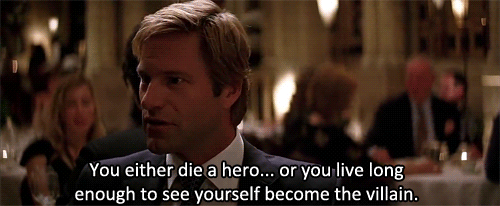Please excuse the highly compressed video
It will load in a bit....
 |
| I could have been very graphic with this picture, but that would defeat the purpose of my argument of the acceptance of violence. |
 Another common trend that came up was the acceptance of violence. Men kill other men to show that killing other men in wrong. Okay, it may not be that simple. But, still. A majority of the highest grossing films of the past years (especially those who past the $1 billion mark) have been action movies. One of the movies that comes to mind is The Avengers. Don't get me wrong, I loved that movie...on my first watching. Second time around, I realized how much mindless action there was in the movie. The final battle, although incredibly epic and put on a grand scale, fell flat because there was no fallout from the fights. The heroes were barely getting injured. I just didn't feel like I should be fearing for these character because I was thinking something along the lines of "they can't kill him. They still need this character to milk out some more cash." Similarly, Man of Steel had the same issues, but I was bothered by it just on my first watching.
Another common trend that came up was the acceptance of violence. Men kill other men to show that killing other men in wrong. Okay, it may not be that simple. But, still. A majority of the highest grossing films of the past years (especially those who past the $1 billion mark) have been action movies. One of the movies that comes to mind is The Avengers. Don't get me wrong, I loved that movie...on my first watching. Second time around, I realized how much mindless action there was in the movie. The final battle, although incredibly epic and put on a grand scale, fell flat because there was no fallout from the fights. The heroes were barely getting injured. I just didn't feel like I should be fearing for these character because I was thinking something along the lines of "they can't kill him. They still need this character to milk out some more cash." Similarly, Man of Steel had the same issues, but I was bothered by it just on my first watching.  One group mentioned that media loves to expose American stupidity. Even though that may be true to an extent, it is somewhat misleading. Some people love to see something "stupid" once in a while. This could refer to shows like Here Come Honey Boo Boo where a family is exploited (they seem fairly oblivious to the impact of what they say), specifically the daughter. This is reality TV show and it adds to the conversation of stupidity. However, it would be incorrect to just say American stupidity. Stupidity exists everywhere. It's just that the media has exploited it here in the States more than anywhere else in the world. Also, it is a false representation of society. It only goes to heighten the stereotype that Americans and fat and dumb. As Gino's group mentioned, many times the people on the show are told to act a certain way simply to get the shot the filmmakers want to get...and here is was thinking that THIS IS REALITY TELEVISION. I guess even our sense of reality is falsified in media today.
One group mentioned that media loves to expose American stupidity. Even though that may be true to an extent, it is somewhat misleading. Some people love to see something "stupid" once in a while. This could refer to shows like Here Come Honey Boo Boo where a family is exploited (they seem fairly oblivious to the impact of what they say), specifically the daughter. This is reality TV show and it adds to the conversation of stupidity. However, it would be incorrect to just say American stupidity. Stupidity exists everywhere. It's just that the media has exploited it here in the States more than anywhere else in the world. Also, it is a false representation of society. It only goes to heighten the stereotype that Americans and fat and dumb. As Gino's group mentioned, many times the people on the show are told to act a certain way simply to get the shot the filmmakers want to get...and here is was thinking that THIS IS REALITY TELEVISION. I guess even our sense of reality is falsified in media today. 
 It's still cool to have a delorean and rock those future nikes from Back to the Future 2
It's still cool to have a delorean and rock those future nikes from Back to the Future 2
 Kick-Ass is a fairly recent movie. (HEY, recent movies can be good too. Those old directors can't always dwell on the past. There is a whole new generation growing up with movies like this rather than Citizen Kane). This is one of those instances where I believe that the movie improves on the original comic book. I head this from a certain youtuber (Comicbookgirl19) and I'd agree completely. Here we go again, this movie is different from the hundreds of other superhero movies coming out today because it is colorful in terms of story as well as visuals. Comic books are supposed to be full of color (well Batman doesn't count or Punisher or some more but you get the point). Even though it's colorful and seems cheerful at first glance, does that mean this movie isn't realistic? NO. This is the most realistic superhero movie I've ever seen. It seriously looks at what would happen if a normal guy went out and tried to be a superhero. Well, he'd get his "ass kicked" right? (get it? I'm sorry). In fact, the lovable character of Dave, AKA Kick-Ass, is quickly beaten and left for death. With instances like this, this movie explores the dark side of the normal person. Would you just stand and watch someone being mugged or would you do actually get in there and stop it. Most likely than not, we wouldn't do anything. Still, Kick-Ass DOES something which is admirably about the character. He gets beat up over and over again and he realizes he's way out of league, but that doesn't stop him from fighting for the good of society. The action scenes in the movie are crazy good and even Nick Cage brings his A-game.
Kick-Ass is a fairly recent movie. (HEY, recent movies can be good too. Those old directors can't always dwell on the past. There is a whole new generation growing up with movies like this rather than Citizen Kane). This is one of those instances where I believe that the movie improves on the original comic book. I head this from a certain youtuber (Comicbookgirl19) and I'd agree completely. Here we go again, this movie is different from the hundreds of other superhero movies coming out today because it is colorful in terms of story as well as visuals. Comic books are supposed to be full of color (well Batman doesn't count or Punisher or some more but you get the point). Even though it's colorful and seems cheerful at first glance, does that mean this movie isn't realistic? NO. This is the most realistic superhero movie I've ever seen. It seriously looks at what would happen if a normal guy went out and tried to be a superhero. Well, he'd get his "ass kicked" right? (get it? I'm sorry). In fact, the lovable character of Dave, AKA Kick-Ass, is quickly beaten and left for death. With instances like this, this movie explores the dark side of the normal person. Would you just stand and watch someone being mugged or would you do actually get in there and stop it. Most likely than not, we wouldn't do anything. Still, Kick-Ass DOES something which is admirably about the character. He gets beat up over and over again and he realizes he's way out of league, but that doesn't stop him from fighting for the good of society. The action scenes in the movie are crazy good and even Nick Cage brings his A-game.



 Even considering that I haven't many of the greatest films ever made, it was still tough coming up with this list, but for my final selection I'll say Forest Gump is among the best movies I've seen. Again, this is one of those movies that I never skip if it is playing on TV. I find movies like this, that tell fictional life stories, very interesting. This include movies like The Curious Case of Benjamin Button and The Shawshank Redemption. I'm not double dipping here. I'm admitting that Forest Gump is my top choice among those films. The most interesting aspect of the film is the main character, Forest. He is likable, caring, honest, and just good human being. As it spans generations, the film covers a multitude of issues on American such as race, bullies, war, and so on. However, the theme of love remains constant throughout the film. I guess the best way I can describe it is by saying the film has heart. Forest Gump is a story of an underdog. We love the underdog. That's why we keep cheering for him and even learn to appreciate his naivete. Because of this it is amazing to see him succeed in the way he does. Not only that, I really do appreciate the amount of complex visual effects they filmmakers used to further the storytelling. They even went as far as to use real footage from Birth of Nation ( click here to learn more about that) and integration Forest's great grandfather. If I start talking about Tom Hank's brilliant performance, I won't stop talking so I'll end it here.
Even considering that I haven't many of the greatest films ever made, it was still tough coming up with this list, but for my final selection I'll say Forest Gump is among the best movies I've seen. Again, this is one of those movies that I never skip if it is playing on TV. I find movies like this, that tell fictional life stories, very interesting. This include movies like The Curious Case of Benjamin Button and The Shawshank Redemption. I'm not double dipping here. I'm admitting that Forest Gump is my top choice among those films. The most interesting aspect of the film is the main character, Forest. He is likable, caring, honest, and just good human being. As it spans generations, the film covers a multitude of issues on American such as race, bullies, war, and so on. However, the theme of love remains constant throughout the film. I guess the best way I can describe it is by saying the film has heart. Forest Gump is a story of an underdog. We love the underdog. That's why we keep cheering for him and even learn to appreciate his naivete. Because of this it is amazing to see him succeed in the way he does. Not only that, I really do appreciate the amount of complex visual effects they filmmakers used to further the storytelling. They even went as far as to use real footage from Birth of Nation ( click here to learn more about that) and integration Forest's great grandfather. If I start talking about Tom Hank's brilliant performance, I won't stop talking so I'll end it here.
